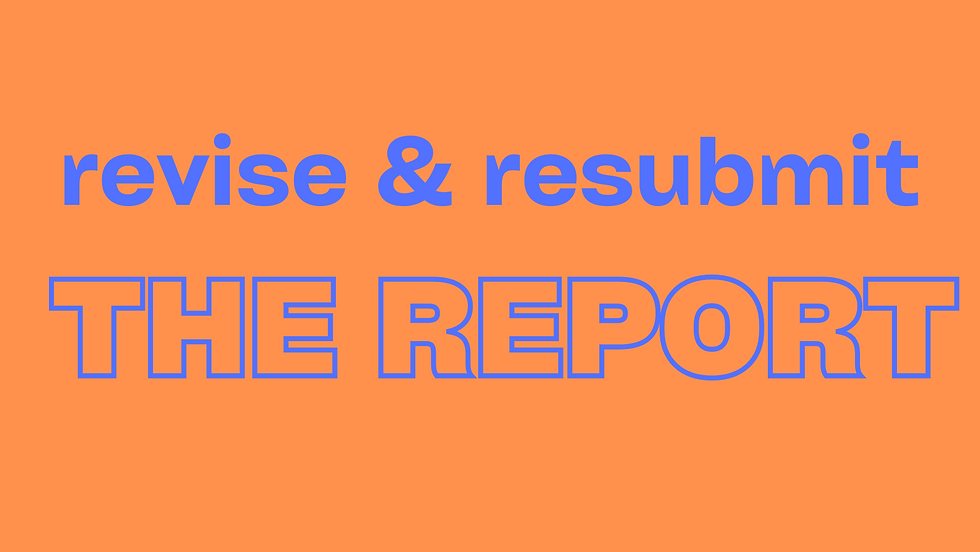How to Survive Your Reader Reports
- Jan 10, 2023
- 3 min read
In the month of January I am developing a series of blog posts aimed to help you work through the process of peer review. For more background on the series, click here. Today I want to talk about what to do when you actually receive the email notifying you that the peer review reports are available.

"The reports are in!" Anyone outside of academia would assume that this subject line (bearing an exclamation point, no less) from a major university press or journal editor would initiate a thrill in the recipient. Perhaps upon seeing this unexpectedly pop into their inbox they would smirk to themselves, self-satisfied and optimistic of what lay ahead for them on the satisfying path to publication.
However, any academic knows that the experience of receiving a reader's report is more likely to be debilitating than immediately rewarding. Reading what someone else thinks of your research can feel like a gut punch as you scan the report for any whiff of dissatisfaction, taking it on board as further evidence of your inability to do this work or perhaps even your unfitness to pursue advanced research AT ALL.
It sometimes seems that being a publishing academic requires an ego of steel. I cannot think of many other professions where one is expected to constantly subject themself (willingly) to the anonymous criticism of others.
Academics have been trolled even before the internet existed!
Criticism of your work is unavoidable, but few of us are taught how to actually review and process feedback in a way that doesn't require us crawling into a hole of binge-watching trash TV, avoiding all further work out of a paralyzing fear of further criticism, and questioning our reasons for choosing this career in the first place. Or is that just me?
I have found that the following strategies really helped me when I received the dreaded email alert "The reports are in!" and to stop the downward spiral before it starts.
Tip #1: Don't click until you are ready!
Even if you tend to open each and every email as soon as you receive it, please hold off on opening this one until you are actually ready.
And by ready I mean that you are (a) able to devote a solid 30-minutes to reading the reports, (b) in a mental space that is not already stressed, overhelmed, or otherwise negative, and (c) not at the end of your work day --otherwise you risk lying awake thinking about the gall of Reviewer #2.
Although replying to your editor is certainly important, it's okay to wait a few days before responding.
Tip # 2: Remind yourself that this is not personal.
The peer review is a review of your writing and your research, but never of your personal worth or value as an academic professional. If you need to take a deep breath and repeat that to yourself before you open the reports, do it. If you need to take a break in the middle of reading the reports because you feel insanely angry, take a break and repeat to yourself, "This is a review of my writing, not of me."
Tip # 3: Expect that there will be criticism.
I know that many of us have that fantasy of an absolutely glowing peer review. You know, the one where both reviewers write: "I have never read anything quite so groundbreaking. This is thoroughly researched and elegantly written. My recommendation is to publish immediately!"
Um, no. In all my years as an editor for a peer-reviewed journal I have never (really, never) sent back an article with these kinds of reviews. They just don't exist. And that is because the point of the peer review is to point out the flaws in argumentations, organization, and so on.
So, do yourself a favor and anticipate that there will be criticism. Reassure yourself that whatever critiques come your way, you will rationally evaluate and respond to them.
Tip #4: Phone a friend.
There are few things more critical than having a colleague, whose feedback you respect and trust. I always recommend building this network during the writing process, soliciting their input on drafts as needed. I always think of these people in the anthropological frame of "participant-observer." When you get the reader reports back, this is the perfect time to reach back out and ask for their objective opinion.
Are there comments that seem out of left-field? Which do they see as the most critical revisions to make?
Having an outside opinion from someone not emotionally attached to the research (or to you) can often help you to see the work more objectively.
If you are paralyzed by your reader reports, I am here to help. Click the button below and we can discuss how.




Comments